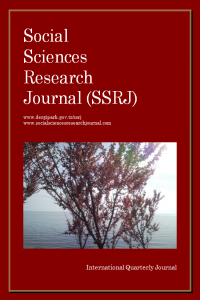The Role of National Culture on Entrepreneurship: An Assessment on the Entrepreneurial Culture of Turkey
The Role of National Culture on Entrepreneurship: An Assessment on the Entrepreneurial Culture of Turkey
Entrepreneurship, Entrepreneurial Culture National Culture,
___
- Amway (2013), Global Entrepreneurship Report 2013, (Online) http://globalnewsassets.amway.com/501484/2013_amway_global_entrepreneurship_report_18.pdf.
- CEC (Commission of the European Communities) (2003), Green Paper Entrepreneurship in Europe, (Online) http://ec.europa.eu/invest-in-research/pdf/download_en/entrepreneurship_europe.pdf.
- Daft, R. L. (2003), Management, Sixth Edition, Thomson, USA. Davidsson, P. and J. Wiklund (1997), “Values, beliefs and regional variations in new firm formation rates”, Journal of Economic Psychology, 18(2-3), 179-199.
- Drucker, P. F. (1993), Innovation and Entrepreneurship, Harper Business, New York. EC (2012), Entrepreneurship determinants: culture and capabilities, EUROSTAT Statistical Books, (Online) http://ec.europa.eu/eurostat/documents/3217494/5748437/KS-31-12-758-EN.PDF.
- EY (Ernst&Young) (2013a), “The power of three”, The EY G20 Entrepreneurship Barometer 2013, (Online) http://www.ey.com/EY-G20-Entrepreneurship-Barometer-2013-Report.pdf.
- EY (2013b), “The power of three”, The EY G20 Entrepreneurship Barometer 2013: Turkey, (Online) http://www.ey.com/ EY-G20-country-report-2013-Turkey.pdf
- Flash Eurobarometer 283 (2010), Entrepreneurship in the EU and beyond, (Online) https://opendata.europa.eu/en/data/dataset/S765_283.
- GEM (Global Entrepreneurship Monitor) (2010), Entrepreneurship in Turkey 2010, Esra Karadeniz, (Online) http://www.gemconsortium.org/country-profile/116/GEM_Turkey_2010_Report.pdf.
- GEM (2012), 2012 Global Report, (Online) http://www.gemconsortium.org/report/GEM_2012_Global_Report.pdf.
- GII (Global Innovation Index) (2013), The Global Innovation Index 2013: The Local Dynamics of Innovation, (Online) https://www.globalinnovationindex.org/gii_2013.pdf.
- GlobeScan (2011), “Indonesia and USA ‘Most Entrepreneur-Friendly Nations’: Global Poll”, (Online) http://www.globescan.com/bbc2011_entrepreneur.pdf.
- Hayton, J. C. and G. Caciotti (2013), “Is there an entrepreneurial culture? A review of empirical research”, Entrepreneurship & Regional Development, 25(9-10), 708-731.
- Hayton, J. C., G. George and S. A. Zahra (2002), “National culture and entrepreneurship: A review of behavioral research”, Entrepreneurship Theory and Practice, 26(4), 33-52.
- Hofstede, G. (2001), Culture’s consequences, Comparing Values, Behaviors, Institutions, and Organizations across Nations (2nd ed.), Sage Publications, Thousand Oaks.
- Hofstede, G. and G. J. Hofstede (2005), Cultures and organizations: Software of the mind, McGraw Hill, London.
- Hofstede, G. et.al. (2004), “Culture’s role in entrepreneurship: Self-employment out of dissatisfaction”, In J. Ulijn and T. Brown (Eds.), Innovation, entrepreneurship and culture: The interaction between technology, progress and economic growth, Cheltenham, Edward Elgar, UK, 162-203.
- KB (Ministry of Development) (2014), Onuncu Kalkınma Planı (2014-2018), Ankara.
- KOSGEB (Small and Medium Enterprises Development Organization) (2011), 2011-2015 KOSGEB Stratejik Planı, (Online) www.kosgeb.gov.tr/ 2011_2015_KOSGEB_Stratejik_Planı_pdf.
- Krueger JR, N. F., M. D. Reilly and A. L. Carsrud (2000), “Competing Models of Entrepreneurial Intentions”, Journal of Business Venturing, 15(5-6), 411-432.
- Kuratko, Donald F. (2014), Entrepreneurship: Theory, Process, Practice, Ninth ed.South-Western Cengage Learning, Ohio.
- Lee, S. M. and S. Peterson. (2000), “Culture, Entrepreneurial Orientation, and Global Competitiveness”, Journal of World Business, 35(4), 401-416.
- Minguzzi, A. and R. Passaro (2001), “The Network of Relationships between the Economic Environment and the Entrepreneurial Culture in Small Firms”, Journal of Business Venturing, 16(2), 181-207.
- Morrison, A. (2000), “Entrepreneurship: what triggers it?”, International Journal of Entrepreneurial Behaviour&Research, 6(2), 59-71.
- Mueller, S. L. and A. S. Thomas (2001), “Culture and entrepreneurial potential: A nine country study of locus of control and innovativeness”, Journal of Business Venturing, 16(1), 51-75.
- OECD (Organization for Economic Co-operation and Development) (2013), Entrepreneurship at a Glance (2013), (Online) http://www.oecd-ilibrary.org/industry-and-services/entrepreneurship-at-aglance-2013_entrepreneur_aag-2013-en.
- Pinillos, M. J. and L. Reyes (2011), “Relationship between Individualist-Collectivist Culture and Entrepreneurial Activity: Evidence from Global Entrepreneurship Monitor Data”, Small Business Economics, 37(1), 23-37.
- Sargut, A. S. (2001), Kültürler Arası Farklılaşma ve Yönetim, Extended 2nd Edition, İmge Kitabevi, Ankara.
- Stel, A. V., M. Carree and R. Thurik (2005), “The Effect of Entrepreneurial Activity on National Economic Growth”, Small Business Economics, 24(3), 311-321.
- The Hofstede Centre (2015), “Strategy, Culture, Change”, (Online) http://geert-hofstede.com.
- The World Values Survey (2011), (Online) http://www.worldvaluessurvey.org/WVSDocumentationWV6.jsp.
- Thomas, A. S. and S. L. Mueller (2000), “A case for comparative entrepreneurship: Assessing the relevance of culture”, Journal of International Business Studies, 31(2), 287-301.
- Triandis, H. C. and E. M. Suh (2002), “Cultural influences on personality”, Annual Review of Psychology, 53(1), 133-160.
- TÜSİAD (Turkish Industry&Business Association) (2002), Türkiye’de Girişimcilik, Publication No: TÜSİAD-T/2002-12/340, İstanbul.
- Wennekers, S. et.al. (2007), “Uncertainty avoidance and the rate of business ownership across 21 OECD countries, 1976-2004”, Journal of Evolutionary Economics, 17(2), 133-160.
- Williams, L. K., and S. J. McGuire (2010), “Economic Creativity and Innovation Implementation: The Entrepreneurial Drivers of Growth? Evidence from 63 Countries”, Small Business Economics, 34(4), 391-412
- Yayın Aralığı: Yılda 4 Sayı
- Yayıncı: Denta Florya ADSM Limited Company
Comparison of Periodic Review Inventory Models under Poisson Demand Distribution
Türkiye’de Çalışan Y Kuşağında İş Tatmini-Motivasyon İlişkisi
Nüket Saracel, Özlem Taşseven, Ece Kaynak
For the Chidren Coming or Brought to Safety Foundations with Multidimensional Scalling Analysis
The Importance of Women in Sustainable Development
H. Binnur Orçanlı, Kenan Orçanlı
2014 FIFA Dünya Kupası’na Katılan Takımların Faktör Analizi ile Sıralanması
Ferda Esin GÜLEL, Erkan TELLİOĞLU
İstanbul’daki Alışveriş Merkezleri Üzerine Bir Araştırma: Kümeleme Analizi
Filiz Çakir ZEYTİNOĞLU, Mert UYDACİ, Ebru Çağlayan AKAY, Başak Değerli, Nevin Karabiyik YERDEN
